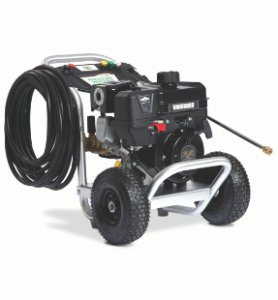 Billy Goat makes quality equipment, but even the best machinery needs to be used and cared for properly. If you recently purchased one of their pressure washers, there are some things you should know to get the most out of it.
Billy Goat makes quality equipment, but even the best machinery needs to be used and cared for properly. If you recently purchased one of their pressure washers, there are some things you should know to get the most out of it.
Before Each Use
Cleaning the pressure washer: Debris buildup should be removed before each use or each workday if you use your pressure washer constantly. The linkages, springs, and controls should be clean as well as the muffler and the cooling fins on the engine and pump. These parts can be wiped off with a damp cloth. Caked on dirt and can be safely removed with a soft bristle brush, while piles of loose debris can be removed with a vacuum cleaner. Never use the pressure washer’s high power spray to clean the pressure washer itself: water can leak into the crankcase and intake, causing damage to the engine.
Checking the inlet screen: Examine the water inlet screen and remove any debris. If the screen is cracked, replace it before using the pressure washer.
Inspect the washer: Check the high-pressure hose, spray gun, detergent siphon hose, and detergent filter for cracks and damage. While a cracking detergent hose will just keep the pump from drawing soap, damage to high-pressure components can lead to dangerous leaks. Replace damaged parts before using your pressure washer.
Changing the Pump Oil
Changing the oil inside the pump is just like changing oil in the motor: there’s a drain plug at the bottom to remove the oil and a cap with a dipstick covering the filler neck.
Only use non-detergent SAE 30 oil. Oils with detergents in them like multi-weight motor oils can leave deposits that will keep the pump from working correctly. Both CAT Pumps and Annovi Reverberi recommend using their own hydraulic oils, although standard 30 weight oil can be used in a pinch so long as they’re changed frequently.
How often should pump oil be changed? Unfortunately, it’s hard to provide a specific interval.
Under ideal conditions with OEM oil, an oil change may only be needed every 500 hours. However, internal leaks, heavy loads, and lower quality oil can cut that time significantly. It’s best to check the oil occasionally and change it if there is any sign of cloudiness or other degradation.
Keep in mind that even with the best lubrication, the seals inside the pump will fail after a few years. Fortunately, both pump manufacturers offer rebuild kits.
Storing During the Winter
If there is any water left inside, it can freeze and damage the pump. Both AR and CAT Pumps make special “pump saver” antifreeze with a blend of lubricants designed specifically for long term storage and freeze protection of pressure washer pumps. If this specialized antifreeze isn’t available, an alcohol-free RV antifreeze can be used. Disconnect the spark plug to keep the engine from starting. Using a three foot (one meter) length of hose, pour the antifreeze into the inlet. Pull the recoil starter twice to cycle the antifreeze through the pump. Reconnect the spark plug.
Water Supply
Problems with incoming water can cause problems that initially seem to be coming from the pressure washer itself. Your pressure washer’s manual should specify the water supply rate needed to run the pump. Usually, this isn’t a problem if you have water from a local utility, but well water systems may not be able to supply water at the rate needed for the pump.
Billy Goat pressure washers are not designed to be run with hot water. Using water that is over 100ºF (38ºC) can cause chattering, erratic performance, and loss of pressure. Sometimes, using a hose that has sat in the sun can cause problems until the water cools it down.
Releasing Pressure
Once you’re done using your pressure washer, the pressure inside the system needs to be released:
Let the motor idle for a couple minutes.
Move the throttle to “slow.” Once the engine holds a steady speed, shut it off.
Point the spray gun toward a safe area and squeeze the handle to release the water and reduce the pressure inside the pump, hose, and gun.
The hose and gun should not be disconnected until they have been depressurized in this manner.
Getting Parts for Your Billy Goat Pressure Washer
www.billygoatparts.com is your one stop shop for everything Billy Goat. We’re a certified dealer for the brand, as well as Honda, Briggs & Stratton, AR and CAT Pumps, letting us supply you with parts for everything on your pressure washer including the engine and the pump. We can ship parts across the U.S. and Canada.
